
The Generation Game – Is it fair?
How can we tackle the increasing 'unfairness' opening up between generations in the UK? We challenged a group of year 10 students from The Henry Cort Community College, Fareham, to play our ‘Generation Game’ and find out. The event, which took place on Friday 8 November, was part of this year’s ESRC Festival of Social Science, an annual week-long celebration promoting UK social science research to new audiences.
The students took time out of their PPE revision to visit the University of Southampton’s Highfield Campus. They spent the morning discussing intergenerational exchange with researchers from the ESRC Centre for Population Change using interactive games, talks and group activities.
The aim of the session was to bring CPC’s work on intergenerational exchange to a new audience of young people, asking them to think about how it affects the lives of everyone in our society. Through the activities, we asked them to think about the contract between young and old, and how we behave towards each other. The games were designed to show them how intergenerational exchange is practised within families, by policy makers and within the workplace.
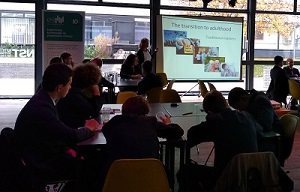
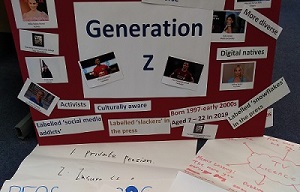
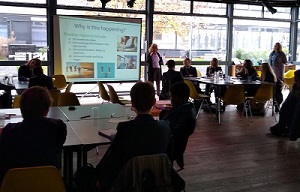
We used the recent report from the House of Lords Select Committee on Intergenerational Fairness and Provision on ‘Tackling intergenerational unfairness’ (25 April 2019) as a basis to explore CPC research and young people’s views. Professor Jane Falkingham OBE, Director of CPC, was Specialist Adviser to the Committee and ‘Exchange between the generations’ is a core strand of CPC’s research programme.
There is a perception that young people today have fewer opportunities and economic benefits than previous generations. At the same time, society is ageing, and people are working longer and retiring later. We invited the group to take the lead on devising solutions and thinking about bringing the generations together.
“It is important to respect all generations, and the generations to come, because we will all have issues at some point that we might have to face together.”
We began the day by asking the students and their group leaders: what is a generation? Teaching Fellow Yazhen Yang used an interactive game to explore what the group understood of different generations, and what stereotypes and assumptions they were aware of. The students correctly aligned the years to each generation, and then had a go at matching some famous faces, facts and assumptions to each group. The students were asked to look at similarities across generations, finding many. While the study of generations and their cohorts can be useful for future planning of our society, this activity illustrated that creating artificial differences can be divisive.
“You don't know what's happening in other people’s lives so must respect that some generations haven't grown up in the way we have.”

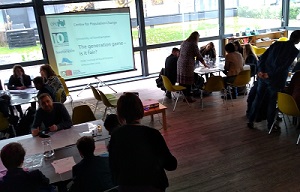
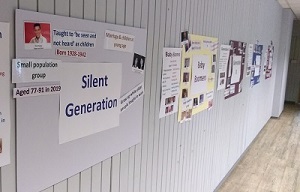
The students then heard from some of CPC’s leading academics:
• Athina Vlachantoni asked the students to reflect on the kinds of things that they currently do for family members and why. Do families support the generations within them because of love, or on the expectation of support in return? The students responded well to the theories of exchange based on altruism vs. reciprocity, and learnt about how social scientists tackle issues like this in research.
• Ann Berrington spoke about young people and their life choices and opportunities. How are young people’s lives affected by the generation they are born into? Ann asked the students to think about the opportunities they have as a young person today. Will their lives follow the same path as that of their parents and grandparents? They discussed the rise of egalitarianism, women in the workplace, changing family structures and access to wealth and education.
• Corrado Giulietti spoke about economic changes, how researchers measure them and how these changes might have consequences across generations. From pensions systems to Brexit, students explored how young people’s lives today are affected by the choices made by previous generations, and invited the students to consider ways to ensure fairness across generations.
“Instead of blaming the other generations for problems, try to work together to solve them”
Armed with this new knowledge, the students were then tasked with solving real-world issues caused by generational divides.
• One group discussed housing with Jason Hilton. More and more young people are living with parents, or “boomerang-ing” back to the family home after University, unable to get onto the housing ladder. What kinds of things can a local authority do to assist both the young and the old with their housing needs?
• Min Qin assisted her group in a discussion about pensions. People are living longer and having fewer children – meaning older generations will require more pension support while there are fewer young people paying taxes to provide this. What solutions could the students think of, to ensure pension funds are fair and fit for all?
• Niels Blom explored issues around flexible working. One in five people aged 45-65 provide informal care for family or friends. How can the workplace accommodate the needs of this large demographic?
• The final group were assisted by Lisa Davison to think about TV licenses. In June 2019 the BBC announced that those over 75 may have to start paying a license fee to watch BBC programmes, cutting off many older persons from their window to the outside world. Over 75’s are a large percentage of BBC viewers and many are increasingly wealthy. What solutions could the students suggest to help the BBC balance the budget, without disadvantaging the third of pensioners who live below the poverty line?
All groups came up with excellent and novel solutions, helped by our CPC researchers, and contributed to a lively group discussion. It was encouraging to hear them engaging with nuanced and complex issues. From the feedback received from the students, they left the session with a greater understanding of intergenerational exchange, and we hope they will continue to discuss the research and its implications for them, their communities and society as a whole.
We asked the students what they would do differently as a result of the day:
“Help out younger and older generations” "Give more to people without expecting much in return"
"Help the environment" "Ask more questions"
The half-day event was organised by the Centre for Population Change as Part of the Economic and Social Research Council’s Festival of Social Science 2019. The nation-wide festival ran from 2-9 November 2019, with 475 events being held across the UK to celebrate and highlight Social Sciences research to new audiences.
The Festival, which is held annually in November, is part of the ESRC’s commitment to promote awareness of UK social science research to new audiences.
With thanks to the students and teachers of The Henry Cort Community College, Fareham, for their time and input.
Posted 13/11/2019 15:11
Back






